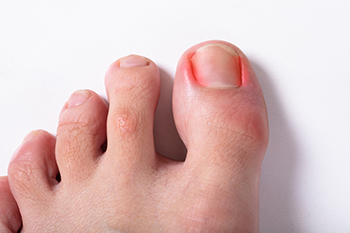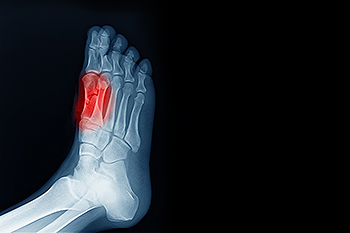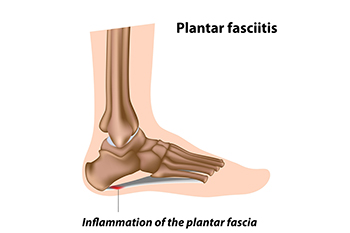Connect With Us
Blog

A severely curved toenail, referred to as a harpoon nail, is a structural nail shape in which the edges bend downward and form a tight arc as the nail grows. This shape alone can cause pressure and irritation because the nail naturally presses into the surrounding skin. An ingrown toenail, however, occurs when the nail edge actually pierces the skin and creates inflammation, swelling, and sharp discomfort. Although the two problems are connected, they are not the same. A curved nail increases the likelihood of developing an ingrown nail, but the ingrown portion is the injury that forms once the skin breaks. Shoes that squeeze the toe, trimming the nail too closely, or repeated pressure can turn a curved nail into an active ingrown issue. A podiatrist can relieve the painful area, reshape the edge, and determine if a minor procedure is needed to prevent recurrence. If your toenail shape keeps causing irritation, it is suggested that you see a podiatrist for effective relief and treatment options.
Ingrown toenails may initially present themselves as a minor discomfort, but they may progress into an infection in the skin without proper treatment. For more information about ingrown toenails, contact Josef Elouze, DPM of Elite Podiatry. Our doctor can provide the care you need to keep you pain-free and on your feet.
Ingrown Toenails
Ingrown toenails are caused when the corner or side of a toenail grows into the soft flesh surrounding it. They often result in redness, swelling, pain, and in some cases, infection. This condition typically affects the big toe and may recur if it is not treated properly.
Causes
- Improper toenail trimming
- Genetics
- Improper shoe fitting
- Injury from pedicures or nail picking
- Abnormal gait
- Poor hygiene
You are more likely to develop an ingrown toenail if you are obese, have diabetes, arthritis, or have any fungal infection in your nails. Additionally, people who have foot or toe deformities are at a higher risk of developing an ingrown toenail.
Symptoms
Some symptoms of ingrown toenails are redness, swelling, and pain. In rare cases, there may be a yellowish drainage coming from the nail.
Treatment
Ignoring an ingrown toenail can have serious complications. Infections of the nail border can progress to a deeper soft-tissue infection, which can then turn into a bone infection. You should always speak with your podiatrist if you suspect you have an ingrown toenail, especially if you have diabetes or poor circulation.
If you have any questions, please feel free to contact our office located in (Holiday City) Toms River, NJ . We offer the newest diagnostic and treatment technologies for all your foot care needs.

Sesamoiditis is a painful condition that affects the small sesamoid bones located beneath the big toe joint. These tiny bones act like pulleys, helping the tendons function smoothly during activities such as walking, running, and pushing off the ground. When the surrounding tissues become inflamed from overuse, repetitive impact, wearing high heeled shoes, or increased athletic activity, pain develops under the big toe and can make every step uncomfortable. The discomfort often worsens during weightbearing activities and may be accompanied by swelling or tenderness in the ball of the foot. A podiatrist can diagnose sesamoiditis through a physical exam and imaging, then recommend treatments that reduce pressure on the area. Care may include activity modification, offloading pads, custom orthotics, or supportive footwear. In more persistent cases, immobilization or other targeted therapies may be necessary. If you have pain under your big toe, it is suggested that you schedule an appointment with a podiatrist for a proper diagnosis and appropriate treatment.
Sesamoiditis is an unpleasant foot condition characterized by pain in the balls of the feet. If you think you’re struggling with sesamoiditis, contact Josef Elouze, DPM of Elite Podiatry. Our doctor will treat your condition thoroughly and effectively.
Sesamoiditis
Sesamoiditis is a condition of the foot that affects the ball of the foot. It is more common in younger people than it is in older people. It can also occur with people who have begun a new exercise program, since their bodies are adjusting to the new physical regimen. Pain may also be caused by the inflammation of tendons surrounding the bones. It is important to seek treatment in its early stages because if you ignore the pain, this condition can lead to more serious problems such as severe irritation and bone fractures.
Causes of Sesamoiditis
- Sudden increase in activity
- Increase in physically strenuous movement without a proper warm up or build up
- Foot structure: those who have smaller, bonier feet or those with a high arch may be more susceptible
Treatment for sesamoiditis is non-invasive and simple. Doctors may recommend a strict rest period where the patient forgoes most physical activity. This will help give the patient time to heal their feet through limited activity. For serious cases, it is best to speak with your doctor to determine a treatment option that will help your specific needs.
If you have any questions, please feel free to contact our office located in (Holiday City) Toms River, NJ . We offer the newest diagnostic and treatment technologies for all your foot care needs.

Plantar fasciitis is characterized by inflammation of the thick band of tissue that runs along the bottom of the foot, connecting the heel to the toes. Symptoms often include sharp or stabbing heel pain, especially with the first steps in the morning or after prolonged standing, tenderness along the arch, and swelling. Causes include overuse, repetitive stress, high impact activities, wearing improper footwear, and biomechanical issues such as flat feet or high arches. Risk factors include obesity, age, occupation, and certain sports. A podiatrist can help by evaluating foot mechanics, recommending stretching and strengthening exercises, providing custom orthotics, and offering treatments to reduce pain and inflammation. If heel pain is affecting daily activities, it is suggested that you consult a podiatrist who can accurately diagnose and treat what may be going on.
Plantar fasciitis is a common foot condition that is often caused by a strain injury. If you are experiencing heel pain or symptoms of plantar fasciitis, contact Josef Elouze, DPM from Elite Podiatry. Our doctor can provide the care you need to keep you pain-free and on your feet.
What Is Plantar Fasciitis?
Plantar fasciitis is one of the most common causes of heel pain. The plantar fascia is a ligament that connects your heel to the front of your foot. When this ligament becomes inflamed, plantar fasciitis is the result. If you have plantar fasciitis you will have a stabbing pain that usually occurs with your first steps in the morning. As the day progresses and you walk around more, this pain will start to disappear, but it will return after long periods of standing or sitting.
What Causes Plantar Fasciitis?
- Excessive running
- Having high arches in your feet
- Other foot issues such as flat feet
- Pregnancy (due to the sudden weight gain)
- Being on your feet very often
There are some risk factors that may make you more likely to develop plantar fasciitis compared to others. The condition most commonly affects adults between the ages of 40 and 60. It also tends to affect people who are obese because the extra pounds result in extra stress being placed on the plantar fascia.
Prevention
- Take good care of your feet – Wear shoes that have good arch support and heel cushioning.
- Maintain a healthy weight
- If you are a runner, alternate running with other sports that won’t cause heel pain
There are a variety of treatment options available for plantar fasciitis along with the pain that accompanies it. Additionally, physical therapy is a very important component in the treatment process. It is important that you meet with your podiatrist to determine which treatment option is best for you.
If you have any questions, please feel free to contact our office located in (Holiday City) Toms River, NJ . We offer the newest diagnostic and treatment technologies for all your foot care needs.


